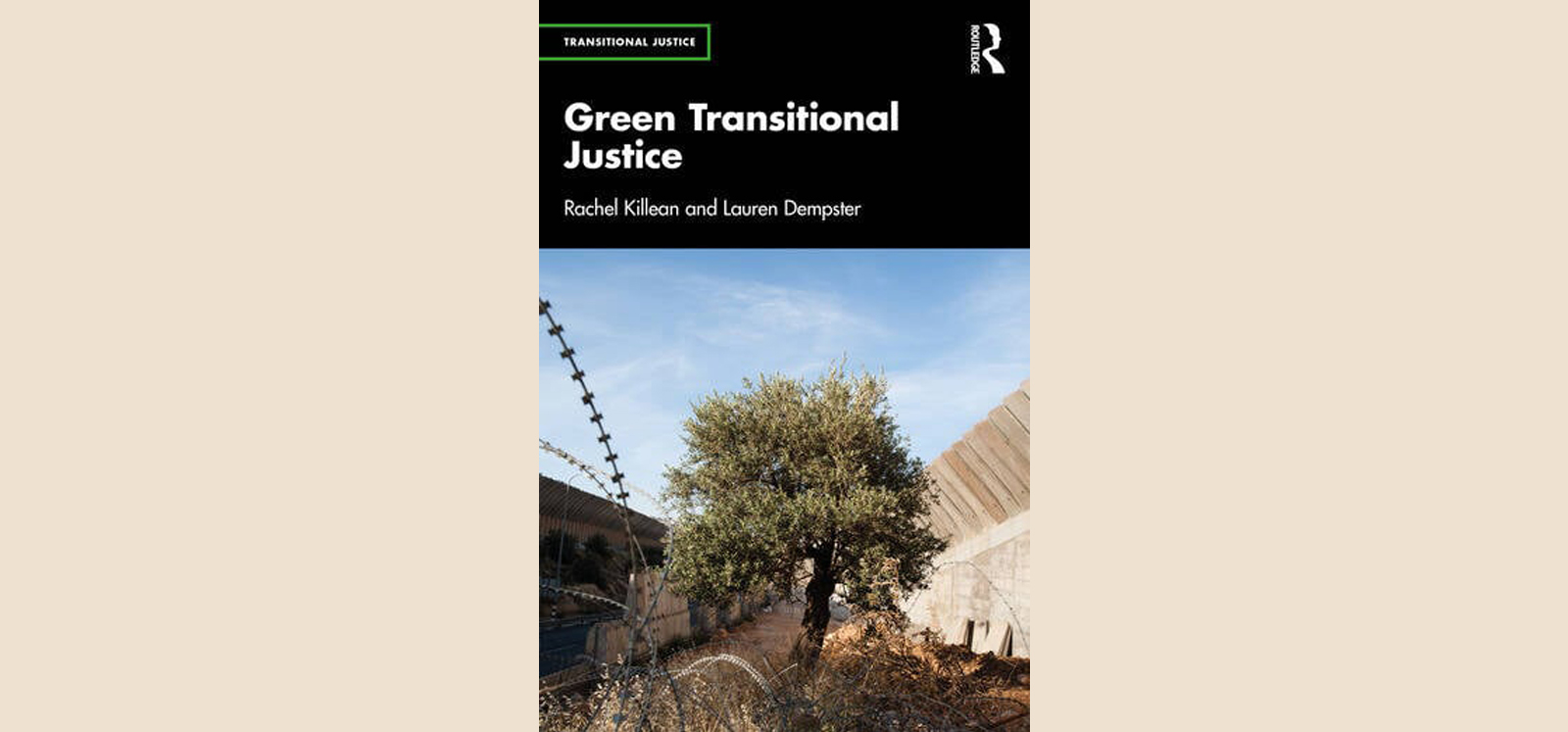Green Transitional Justice
Dr Lauren Dempster

In this blog post, Institute Fellow: Rights and Social Justice, Dr Lauren Dempster (School of Law, QUB) and Dr Rachel Killean (The University of Sydney Law School) introduce their new book, Green Transitional Justice.
Our new book, Green Transitional Justice (Routledge, 2025) examines the relationship between transitional justice, mass violence, and environmental harm. The book’s starting point is our contention that transitional justice, as a field ‘associated with a society’s attempts to come to terms with a legacy of large-scale past abuses’ should seek to recognise and address the multi-faceted and often harmful relationship between mass violence and Nature that is currently relatively overlooked in the field.
In this book we interrogate four key limitations of the field that we argue have resulted in the marginalisation of environmental harm - that the field is (i) neo-colonial (Chapter 2); (ii) dominated by anthropocentric legalism (Chapter 3); (iii) struggles to engage with structural harm (Chapter 5); and (iv) is aligned with a neoliberal agenda that can enable further harm against Nature (Chapter 6). We suggest ways in which transitional justice could be adapted to better address harms against Nature, by integrating principles from environmental justice, Indigenous knowledge systems, feminist epistemology and ecocentric perspectives. We give consideration to (for instance) the recognition of Nature as a rights-bearer or as a victim and the potential of transformative approaches to transitional justice.
The ideas we explore in this book originated for us some seven years ago, while we worked together in QUB School of Law. The book draws together Rachel’s developing expertise on the potential of a crime of ecocide and rights of nature, and both authors’ interest in critical approaches to transitional justice. We first explored the transitional justice-environmental harm relationship in a 2022 chapter in Matthew Evans’ (Sussex Centre for Human Rights Research) edited collection, Beyond Transitional Justice: Transformative Justice the State of the Field (or Non-field) and subsequently an article published in Genocide Studies and Prevention. After sharing some of our ideas in a Covid-era ‘Twitter conference’ hosted by the British Society of Criminology’s ‘Green Criminology Research Network’, we were approached by Routledge to develop a monograph. We are grateful to Colin Perrin for his immediate enthusiasm for this project and for encouraging us to explore the topic in more depth.
The Institute for Global Peace, Security and Justice played a valuable role in the development of this work. We were invited to deliver a virtual presentation in the Institute’s Fireside Chat series in April 2021, and an in-person workshop in November 2021 on Transitional Justice: Future Research Agendas. We are grateful for feedback and thought-provoking queries raised at both these events. In Semester 1 of the 2022-2023 academic year, Lauren was awarded the Institute’s Sabbatical Fellowship. This opportunity was key to the book’s development, giving space and time in the Institute to engage in-depth in the knowledge production scholarship, one of the foundational bodies of theory that the book draws on. Furthermore, this award covered travel to Australia in 2022 to work with Rachel at Sydney University, and present on the work at the 8th Annual Australian International Criminal Law Workshop in Sydney and the Australia and New Zealand Society of Criminology Annual Conference in Darwin. All of these experiences aided the book’s development, as it is challenging to co-author from opposite sides of the globe!
At a time when we are being reminded daily of the human suffering caused by mass violence, addressing environmental harm may at first glance seem, as we note in our Conclusion, ‘pointlessly utopian’. However, the atrocities happening around us now demonstrate the significant and lasting harms against nature that can both drive and result from mass violence.
Israel’s atrocities in Gaza and long-term illegal occupation have decimated Palestinian land, destroying olive groves and orchards, and polluting soil, groundwater, sea and air. Elsewhere, the Russian invasion of Ukraine has caused pollution and threatened ecosystems, with attacks on nuclear, hydro and fossil fuel facilities risking contamination of soil and ground and surface water. These harms have severe implications for human beings, other-than-human animals, and even the climate.
Fundamentally, as we argue in Green Transitional Justice, human beings and Nature are inextricably linked. Better understanding of their interdependence can shine further light on the causes of conflict, help us to more fulsomely acknowledge and respond to the harms of atrocity crimes, and lay a stronger foundation for the building and maintenance of sustainable peace. The impact of our failure to protect Nature is becoming increasingly clear, and as the global climate crisis worsens and the over-exploitation of natural resources continues, in-depth and critical understanding of the dynamics between mass violence, people, land, and natural resources will become increasingly essential.
Biographies
Lauren Dempster
Dr Lauren Dempster is a Senior Lecturer in the School of Law, Queen's University Belfast and Institute Fellow: Rights and Social Justice. Lauren's research is in the field of transitional justice, with particular focus on the disappeared and responses to disappearance, conflict-related environmental harm, victim mobilisation, and efforts to address the legacy of the Northern Ireland conflict. Lauren currently holds an AHRC Fellowship on Forensic Scientists and Knowledge Production in Transitional Justice.
Rachel Killean
Dr Rachel Killean is a Senior Lecturer and the current Associate Dean for Student Life in Sydney Law School. Before taking up this post in 2022, she was a Senior Lecturer in Queen's University Belfast. Her research interests focus on transitional justice and International Criminal Law, in particular sexual and gender-based violence, victims’ rights and victimology, ecocide, conflict-related environmental harm and Rights of Nature. Rachel is currently Chief Investigator on the project, The Khmer Rouge on Trial: Reflecting on the Extraordinary Chambers in the Courts of Cambodia with the Sydney Southeast Asia Centre.
